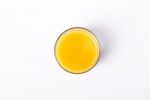Over the past couple of years there has been a lot of buzz around sugary beverages. Most people know that pop or soft drinks are loaded with sugar and are considered to be empty calories – meaning that they do not provide any nutrients. It’s not surprising that a number of studies associate the recent rise in obesity with increased consumption of sugary drinks.
In fact, drinking a can of pop per daily in children, has been associated with a 60% increase in obesity risk. I’ve noticed that to replace pop, many tend to choose juice. Those who are really concerned try to find “real” juice beverages. But is juice really a better option? A 2015 study found that toddlers who drank 100% fruit juice on a regular basis were at higher risk of becoming overweight by 4 years of age when compared to those who did not drink it as regularly or avoided juice all together. This observation is in part due to the high sugar content of fruit juice!
While these studies are on Children, the story told is likely no different for adults.
You might be wondering that an orange would be just as bad then! Well, here are some points to consider:
- When you have fruit juice, you are getting much less fibre that you would from a solid fruit – not only does fibre help you feel fuller (therefore satisfying your hunger in a smaller amount), but it also slows down the absorption of sugar into your blood.
- On the same note remember that to get a cup of juice you are likely using 3-4 oranges – would you sit down and have 3-4 oranges at once? Even if you do think of how long it would take to take in all those oranges vs. a cup of juice!
- Remember that fruits contain a lot of other ingredients that provide health benefits, such as antioxidants. The more you “process” your fruit, the more likely it is for these amazing nutrients to undergo reactions that change them into something else!
I can go on and on. The take home message is, while 100% fruit juice may be a better option than pop, it is not the best option. When you juice fruits, you are more likely to have a large volume of the beverage (which contains lots of sugar, in addition to all the good nutrients!) in a short period of time. Since you have removed the fibre and because the juice is in liquid form, it is quickly absorbed and causes a sharp increase in your blood sugar (something you definitely want to avoid if you have diabetes!). In addition, since you are not giving you body enough time to realize that it has received all that sugar, and because the fibre isn’t present to help you feel full, you tend to eat more! No way you take a cup of orange juice as your only breakfast, right?
I’m getting off track here… going back to our original question: compared to pop, you could say that juice is not just empty calories … you do get some vitamin C and other nutrients along. This is true. But considering all the points I mentioned, and recognizing the fact that nutrients such as vitamin C are commonly available in our diet and are easy to get, is it really worth it?
That being said, I am not labeling juice an unhealthy choice. However, I am recommending that you drink it in moderation and choose whole fruits over juice to get all the great benefits that they have to offer.
